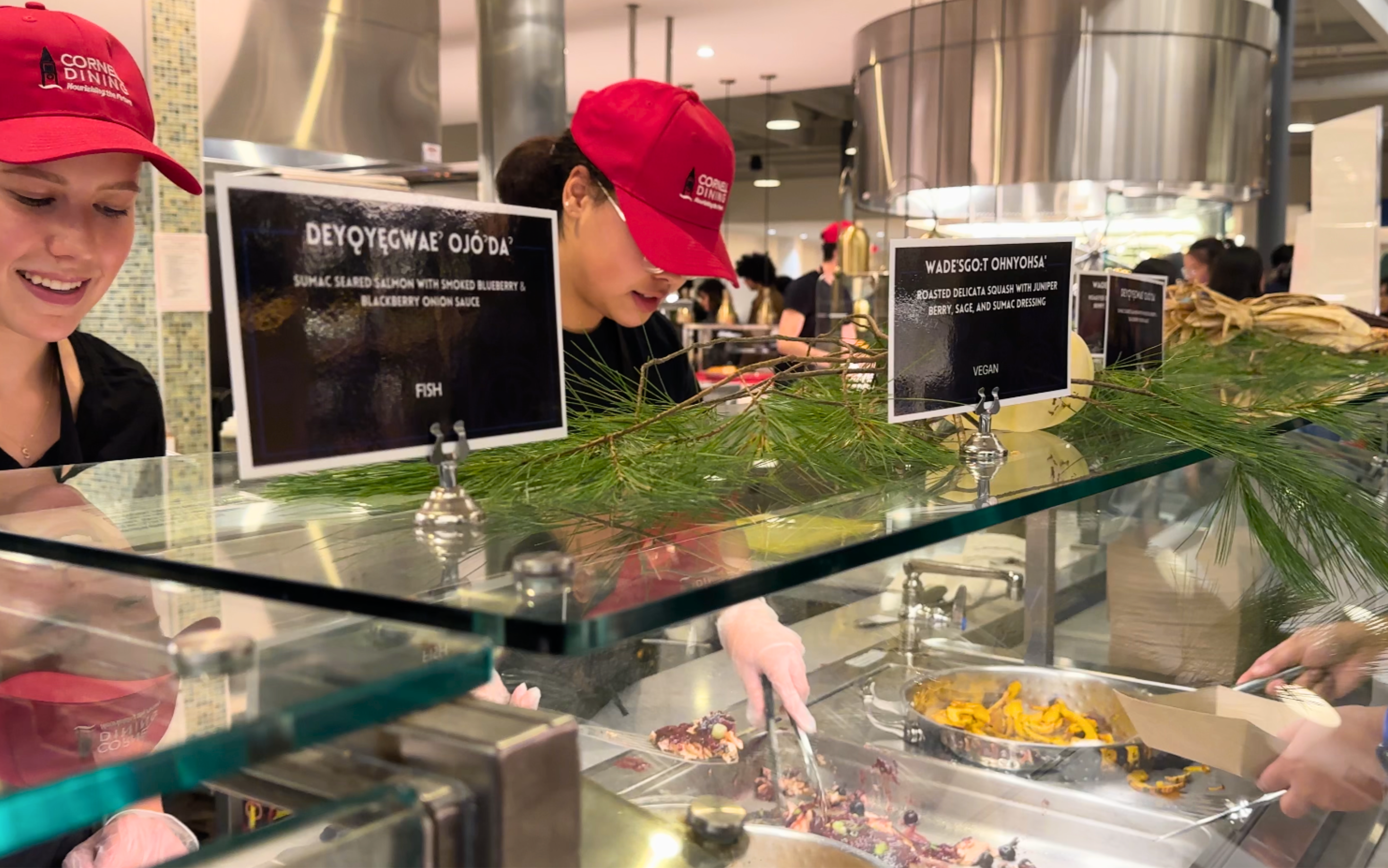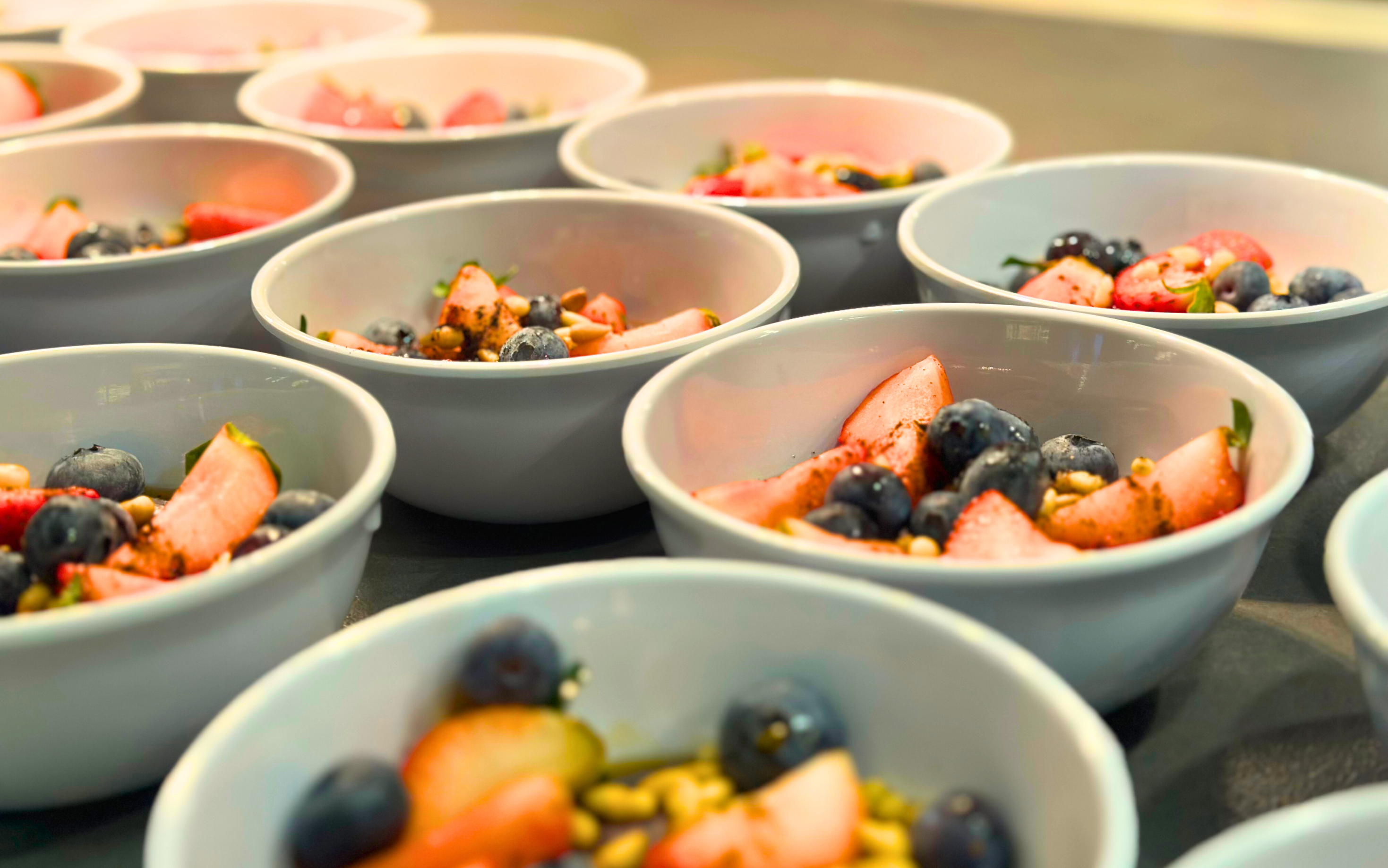Ǫgwahǫwéhneha:ˀ gyǫhéhgǫh: ‘Food of the Original People’ returns to Morrison Dining

By Ben Badua, Student and Campus Life
North Campus sits on a hill on what was the old Ganędagǫ: village. Today, it’s the location of Toni Morrison Hall.
“It’s important to us to bring awareness to that and recognize place,” said Haeñhyanoñhna Joseph Powless, from the Onondaga Nation, and a Program Assistant at AIISP and the Akwe:kon program house. “What better way for this to happen than to share the foods that people were eating 8,000 years ago on this land.”
Now in its second year, Ǫgwahǫwéhneha:ˀ gyǫhéhgǫh or Food of the Original People returns to Morrison Dining on Nov. 4. A collaboration between Cornell Dining, the American Indian and Indigenous Studies Program (AIISP) and Cornell Botanic Gardens, the event will explore the rich culinary and cultural traditions of Indigenous peoples while bringing the Cornellians together to promote student well-being and a greater sense of community and belonging.
“Food helps create conversation and allows us to bond and form connections in a different way,” said Paige Peters ’27, who identifies as Saginaw Chippewa. “These events are a really valuable learning experience that highlight the plurality of personhood at Cornell, and it also gives us the opportunity to talk about our indigeneity through a really positive lens.”
This year’s menu will feature Mixtec and Totanac cuisine – from Indigenous groups originating in what is now Mexico – alongside traditional Gayogo̱hó:nǫˀ fare. Attendees will be able to read the English translations of menus written in native languages as well as hear their corresponding pronunciations. Students can also engage with table tents that explain the importance of the meal’s ingredients to Indigenous communities while members of AIISP and other Indigenous student groups share information about their respective organizations.
While Cornell Dining and senior chefs like Morrison Dining’s Joshua Holden host special culinary events throughout the year to, “create a sense of comfort and belonging through our take on authentic food that celebrates our student body’s diverse cultures and eclectic tastes,” it also aligns with the University’s broader, more holistic approach to prioritizing student well-being.
When Cornell adopted the Okanagan Charter in October of 2022, it joined health promoting scholars, researchers, practitioners and administrators from 45 countries in pledging to embed health and well-being initiatives across all facets of university life.
Developed in 2015, the charter lays out a set of principles that, “plays a central role in all aspects of the development of individuals, communities, societies and cultures—locally and globally.” This framework stresses the interconnectedness of three domains: the well-being of members of the community (people), the overall campus environment (places) and the health and ecological sustainability of our natural surroundings (planet).
“We recognize that health and well-being are foundational to success and are committed to strengthening existing systems and expanding access to resources,” said Julie Edwards, assistant vice president for student health and well-being. “The Okanagan Charter provides a holistic framework to health and well-being that will guide our efforts to support all members of our community in flourishing - both inside and outside the classroom.”
According to Powless, Cornell’s status as a Health Promoting Campus and Okanagan Charter adoptee underscores the long-standing Haudenosaunee concept and practice of ga'nigoñhi•yóh or the ‘good mind.’
“It’s a mindset and practice we have in our culture that focuses on the prioritization of your mental health and well-being,” said Powless. “By focusing on our mental well-being, it allows our physical body and presence to operate and move through what we call ‘Ohahiyoh’ or the ‘good path,’ of peace, respect and connection, and allows students to grow as Indigenous scholars.”
To address issues related to mental well-being and belonging, Powless and others at AIISP continue to develop programming and provide student support services because, “it’s critical that our students have a ‘third place’ or settings and public gatherings separate from home [first place] and the classroom [second space] to be themselves, feel heard, supported and uplifted as individuals.”
Collaborative events between campus partners across the university, like the Indigenous dinner, often represent that third space, while also serving as a vehicle for cultural preservation, individual identity exploration and community building.
“I think native people have a really strong and sacred connection to our food and every time I have Indigenous food it reminds me of my Papa,” said Kaylah Toves ’26, a native Hawaiian who also has ties to Acoma Pueblo in modern day New Mexico. “Even though he’s all the way back home, it quite literally feels like him and I are in the kitchen and we're making the fry bread, we’re making the soup, and we're cutting the corn. It's so comforting, it feels like home, and I get to have a sense of mindfulness that allows me to fully indulge in my native identity rather than just that of a ‘student.’”

Connecting Two Worlds
Sumac was one of the first plants that Peters learned to recognize and identify. But while the plant sciences major regularly encountered the flowering plant typically used for culinary purposes on her family’s property in Michigan, it wasn’t something she’d ever thought to consume. While attending last year’s inaugural Indigenous-themed dinner at Morrison Dining, she finally got her chance.
“There was this salmon dish with a dressing – and learning that it was sumac was a crazy experience because it was the collision of two different worlds,” said Peters. “I also had a bison stew that reminded me of one of my mother’s soups and had this realization that this is what my ancestors used to eat.”
To Peters, those similar feelings of comfort extended far beyond Cornell. Inspired by last year’s dinner, she returned home to Michigan during break and worked with her siblings to prepare a traditional Winter Solstice feast of wild rice, salmon and other Indigenous food in hopes of helping her family reconnect with their community, culture and traditions.
“Events like these enable more conversations and more dialogue that are really valuable to the relationships we have with those around us,” said Peters. “It’s a great learning experience because there’s something different about smelling the food, tasting the flavors and feeling the textures that doesn’t translate when you’re just reading a textbook and this experience helped me facilitate that reengagement by making me more comfortable with something that had been foreign.”
For Toves, staying home in her native Hawaii would have been the easy choice. But driven by the desire to learn more about her family’s mainland Indigenous roots, she made the decision to push outside her comfort zone. Taking the steps to engage with and explore her native identity wasn’t always easy, but it was rewarding.
“My first year felt a little isolating and alienating,” said Toves. “It was through AIISP and events like the Indigenous dinner that made me feel like I have a place here.”
That feeling of belonging led to the confidence Toves credits for her personal growth and development while on the Hill.
“I definitely have a stronger sense of self, and for me, feeling firm and more rooted in my identity has been a key to pushing forward,” said Toves. “When I realized that I can harness it [my identities] all together and just own who I am, is when I started to feel most comfortable. That’s also when I started to make more friends, get more involved in campus events and started to excel academically.”
As we observe Native American Heritage Month this November, we invite you to explore more about the American Indian and Indigenous Studies Program (AIISP), the Akwe:kon program house. These initiatives—rooted in history, culture and community—reflect Cornell University’s commitment to honor Indigenous heritage, foster belonging, and support student well‑being.
